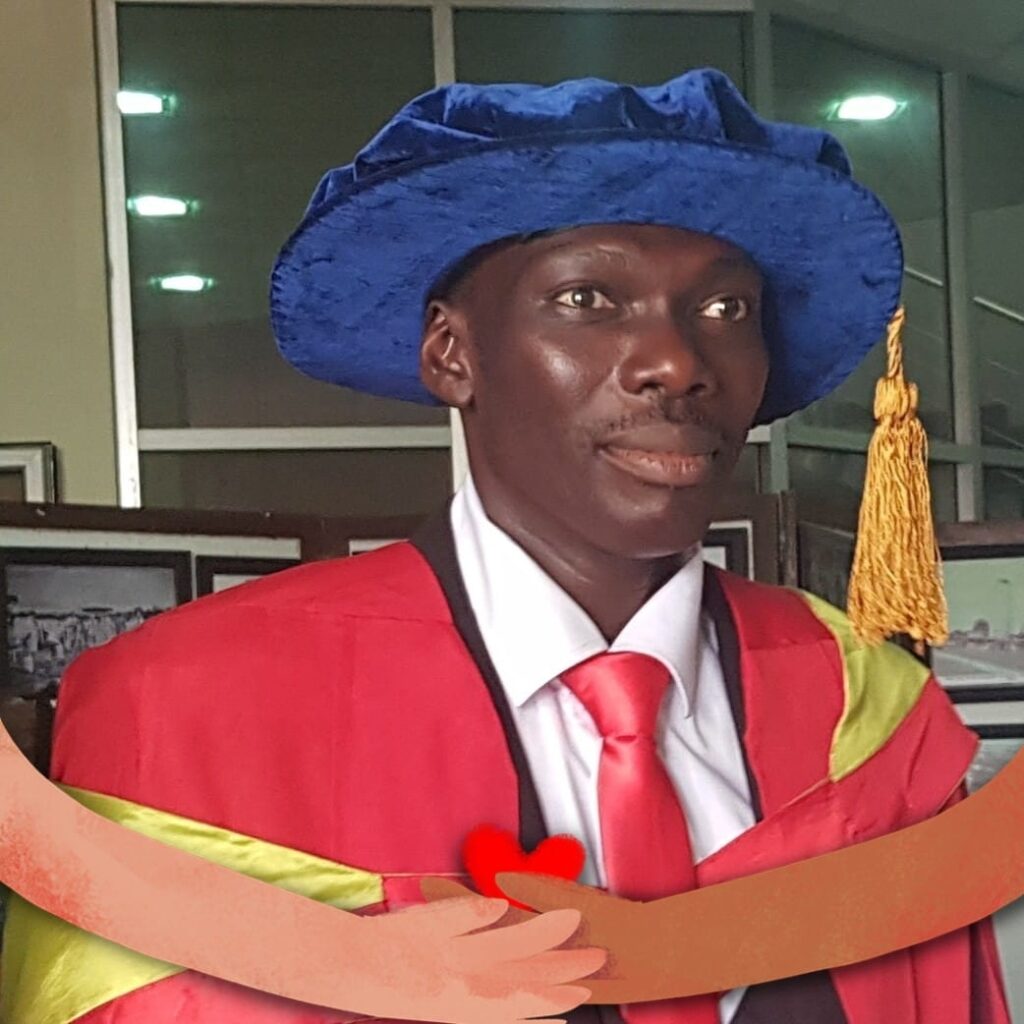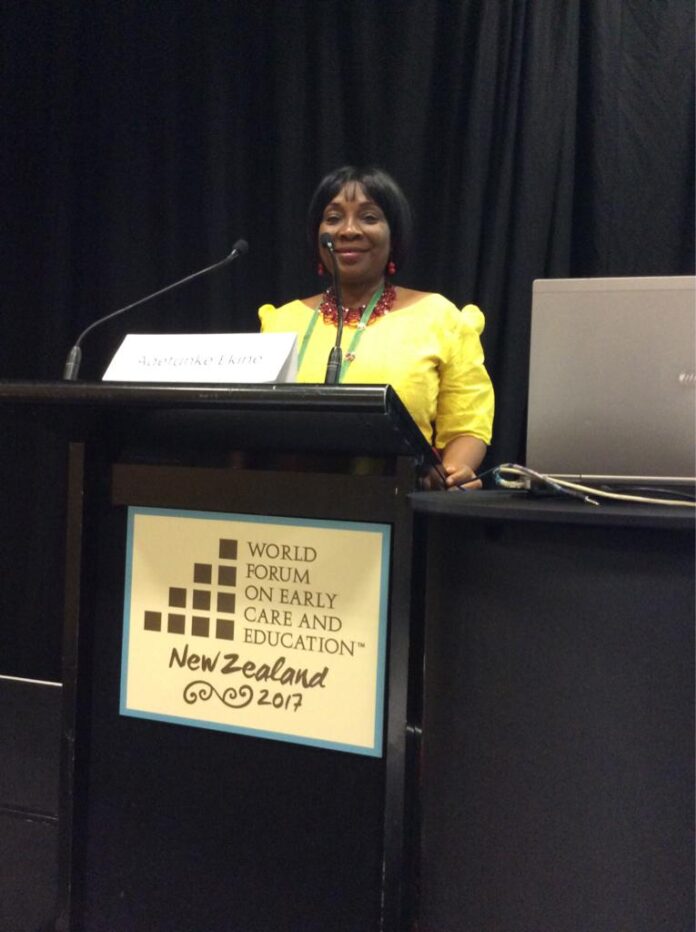Mrs. Adefunke Ekine is the Deputy Director -Research and External Relations, Tai Solarin University. She is also the Executive Director- Youth Care Development and Empowerment Initiative.
Dr. Fortune Afatakpa is the convener- Good Boys Project and the Dean of Student Affairs at Dominion University.
In this interview, they discussed the possible causes of violence among youths and how to control it.
What exactly do we mean by violence amongst youths at Primary and Secondary schools?
Dr. Ekine: Generally, violence can be defined as any act of threat or harmful act that is meted against a person, it may be from a boy to a girl or from a girl to a boy. But anything that infringes on the right of a person, an act of bullying, teasing, assault, harassment, sexual harassment, and as you mentioned in the introduction corporal punishment is now taken as violence against a child.
Even though as Africans we believe in using the rod but when it causes physical injury, then it is an act of violence on the child.
So, what signs should we watch out for before we know our child might be going through some form of physical violence in school?
Dr. Ekine: One of the things that we notice is that when a child is being abused or harassed, such a child tends to withdraw. So for parents or teachers, you need to watch out for a child that has been very active before and suddenly the child is withdrawing or staying alone, doesn’t want to interact with anybody then you want to prod further to ask exactly what is going on in the mind of such a child or maybe a child that has been free to express himself or herself in front of an adult and immediately that child sees the adult that child shows some form of fear or just wants to run away from the adult or doesn’t want anything to do with the adult then there is something that has caused that child not to trust the adult again. So the signs of withdrawal: staying aloof, not participating and when the grades of a child begin to drop, especially a very brilliant child, you’d want to ask what exactly is happening because at times it even affects that concentration in class, they don’t feel free or safe again to go to that space. So those are the things that we can see and then we can decide to prod further.

Some people believe that youths are plagued with violent behavior as a result of exuberances, what are other things that can cause violent behaviors amongst Primary and Secondary school children?
Dr. Ekine: Well, I will start with the Primary school children. Primary school children play out what they see so to them, from the research that we carried out, especially the young ages just see it as play. They’re having fun, it’s games to them. By the time they start inflicting injuries on one another then you know it’s more than a play.
Most times children in the Primary school from Nursery upwards, want to act out what they have seen either on the media they’ve heard or watched and they’ve seen played out in the homes. If the parents are fighting every day, a child that has lived in violence thinks that for me to get something from my friend, I must be violent, must be aggressive. So if a child is raised in an aggressive environment or aggressive home, a situation in the home- always seeing the father beating the mother or the mother beating the father, even verbal abuse when you shout on children often they tend to start shouting too and start taking things by force.
So first of all, what they see is what they play out, is what they act out and for the youth, when you say youthful exuberance that’s not really the main thing, at times it may be that such youth has been a victim of such abuse or violence because we found out that if a youth is abused when they are young they grow up tending to the same not really intentionally but it has not been addressed you’ll just find out that the person becomes aggressive and the person will say, “Okay I’ve gone through this before, I just want to do the same to another individual.”

Then if they’re on drugs, if they’re taking alcohol… these days youth in Secondary school even in some Primary schools are introduced to all these things. There is one name that I can’t remember now but I know that there a lot of things that the youth get involved with now and then the media, what they watch, what they see, the films they watch, all those things can affect their behavior and they want to play out what they have seen.
And some of us believe it’s a matter of power, inequality of power, the man is always right or we assume he is right so culturally we train the boys or the men to have their way. If anything happens, we will say it’s the woman that has to submit and remain docile and all that. So it’s a power show at times, the boy wants to forcefully have his way with a girl. He’ll just say “I’ll get you, I’m trying to toast you (especially for teenagers) and you’re not coming around to say ‘yes’ to me”, so bullying starts.
At times power play, inequality in power-sharing and everybody thinking that the man is always right and girls should always submit and you know from home we train the girls to always keep quiet, I’m not saying they should not keep quiet, we should give assertive skills to our girls so that they can be bold and they can say whatever it is they are going through. They should be bold enough to open up and to speak out when they are being harassed or somebody is unjustly dealing with them, they should be able to fight for their rights and to know that they’re equal to the boys.

In this part of the world, would we be right to say that we do not have as much violence in our schools- that’s primary and secondary schools as we have in other parts of the world
Dr. Ekine: That’s not true (really?) that’s not true because we just conducted research and we went to 30 schools in 5 states and the Federal capital with a team under Youth Care from January to March and we ended just before the Pandemic and I was happy that we were able to do that aspect. So we’ve analyzed the research findings and one of the things I was doing during the media talk is to be able to share with people, we have over 70% bullying taking place in those 30 schools and this is a comparative study with researchers from Jamaica, Kenya, and Malawi.
And when it comes to bullying, I worked with 1,141 pupils, 643 of them said that they’ve been bullied or they have bullied somebody. So Nigeria had the highest cases of bullying, when we’re talking about the schools, we actually worked with Primary schools, we worked with Primaries 4, 5, and 6.
So if we have over 70% in Primaries school at that level then you can imagine what it will be in Secondary schools. Then for sexual abuse and sexual harassment, the prevalence was 47.1% in those 30 schools I went to.
Now, Dr. Fortune Afatakpa, what is your view on sexual harassment as a form of violence against girls.

Yes, violence among Youths on females has become a worrisome phenomenon amongst us, it is not even limited to the youth you find adults who are predating the females. The truth is, if this is not checked then we will have a crisis on our hands in years to come.
It is not even youth alone, even children, the female child is being predated on by so-called adults. Now it is clear that we have a situation while we are not sitting down with the problem, we need to proffer solutions to this menace.
The first thing we need to understand is the sexual objectification of womanhood, that is the root cause as far as I’m concerned, that is a critical root cause for violence against the female child or female Homosapien.
Look at our videos, look at musical videos, look at our adverts, look at media campaigns, what do you see? The sexual objectification of women.
Mrs. Ekine, going by the research you conducted, would you say that we have more violence against girls than boys?
Dr. Ekine: Well in the literature, before we went on the field, most literature has actually recorded violence against girls and women which is very high and that was the background with which we went to the field.
But surprisingly, from the 4 countries that I mentioned we found out that at that level, the boys reported even more violence in Primaries schools because we all worked with Primaries schools and in Nigeria as I said, I worked in: Oyo, Ogun, Lagos, Edo, Kwara, and the Federal Capital. We worked with 5 schools each from those states and we just talked with the boys and girls in Primaries 4, 5, and 6. In total, we worked with over 1,000 children.
So we were wondering because in literature there has not been any record about boys actually saying they’ve been violated at that age. One of the things that we as researchers are still looking at is the culture of silence may have been one of the things playing out there because even the girls don’t want to talk, so they feel “if I confess; if I say that I’ve been sexually harassed, I’ll be stigmatized.”
Because we went further to have what we call Focus Group Discussions, which is talking to the boys and the girls separately in a smaller group of 5 or 6 children and you’ll find out that the girls now narrated more their experiences and the way it has happened to them.
But when they were talking at first, filling the questionnaire and the general talk when everybody was there, the boys’ mean average was more than the girls’, just a slight difference. So we were wondering why, what we concluded is it could still be the issue of boys being bold to talk and to say whatever it is they are going through even though now we’re having pockets of violence against boys being reported
And I don’t want to mention any religious organization but you know there was a time like 2 or 3 years ago when there was an outcry against the young boys being molested by elderly men and all those, which was a global thing, particularly the religious cycle.
I’ve talked to some fathers who have been on this show with me and they said, “well they’ve had some experiences too, even as men when they were boys, it’s just that in those they were just coming out…” so it was happening but it was not well recorded.
So in this particular research, the boys spoke out more and that was a surprise but it was not only in the Nigerian data but in all the 4 countries. We are still going to go further, that’s why we’re saying that it may still be the fact that girls are always told to keep quiet, the culture of silence and stigmatization. So they don’t want to affirm that “this has happened to me.”
So there is even the possibility of us having more boys being molested, being abused than girls?
Dr. Ekine: Yes, what we have concluded is that both boys and girls are having these experiences, they’re being molested, being harassed. Amongst themselves, within siblings and from adults to the younger ones. So it’s really like I called it, a “Subtle Pandemic”, bigger than COVID because children’s habits are formed quite early.
If this is not tamed, we are having people develop into either perpetrators in the near future or we’ll just have young girls and boys who have been harassed, abused, who have mental breakdowns (low self-esteem), yes and who cannot cope, even some have suicidal thoughts as early as that.
This is really huge, how aware do you think people are, especially mothers- parents, of the dangers of violence in Primary schools?
Dr. Ekine: I think the awareness is very low (which is very dangerous) and that is why one of the things I was looking up to and I’ve been doing in the last two-three weeks is creating the awareness on media and we had a Zoom meeting two days ago and also talking to people. As soon as school reopens, we intend to at least go back to the schools where we worked to create dialogue, what we call community dialogue, between the parents and the teachers in that community to be able to let them know.
The other thing is that the religious people, I’m not talking about any religion but we found out that religious people deny this, they think that it can’t happen but it’s real. We’ve seen four-year-olds in Primary school being abused by another child and by the time you sit them down, they tell you “mummy and daddy are doing it, we saw it and so….”
But you know in those we played ‘Daddy and Mummy’ role but we didn’t go that far, we were not exposed to that and all these as the Doctor in Dominion University mentioned, the media is not helping. The shows that you expose your children to and all these things, so even if we are going to allow them to use the media, to watch Television, to use iPads, it has to be restricted, it has to be monitored.
Now before we go into the prevention or solutions as it might be. How can you as a parent, encourage your 4-7-year-olds to speak up and open up to you when he or she is being abused? By abuse, I’m not restricting it to sexual.

Dr. Ekine: There are different kinds of abuse: psychological, emotional, verbal too, it’s not only sexual abuse. I think from home, mothers, and fathers but especially mothers, we should first and foremost train our children, give them the confidence that they need to be open.
Most mothers shout down the girls even in the way we raise them, we do not raise the boys and the girls the same way. It’s only very few families that actually value girls and raise them the same way, some are cultural and religious but that is wrong, I’m a Christian and I don’t think that God made us second class, we are equal to the men.
So the way we raise children, we should be able to let them know that if there is anything that I’m not clear about, be bold to speak about it. So if at home in your interaction with your child, your child cannot even sit you down and say, “mummy I’m having a headache”, how will the child be bold enough to talk to somebody outside? So everything starts from home, there should be a cordial environment in the home where both parents are accessible to the children, they should have listening ears that the children can go and tell them, “uncle did this or aunty did this and this is what I experienced” and the parents won’t scold them.
The victim is always being blamed, let me confirm this with what we saw in the research, there was a question we asked, “What do you think is causing this?” and over 80% of the children said the dresses that the girl’s wear, can you imagine? As early as that age and I told somebody, why would you blame the girl? She didn’t buy the dress by herself (even at that age). So you see, I know indecent dressing is not good, we should train our children to dress decently. What I’m saying is that they are not talking to themselves to have self-control or to look away because you can’t keep telling everybody to dress well.
There are some people who will just not dress well but you must be able to control your emotions, your drive, your libido (even a man should attain that sense of maturity, even when you see a naked woman), that is it, because in developed countries will you tell them not to wear this or that?
See that as early as that age they are already blaming the girls, what they said is, their uniforms are tight, these days girls mature early. You can see a girl in primary school who is already developed and has reached puberty and all those things. Mothers should help by maybe giving them decent clothes and not torn clothes to go to school but at the same time boys too or the men should understand that it is not everything they see that they allow into their system, “I can contain myself, I can have self-control.”
Alright, let’s now move to the solutions because that’s the purpose of the Interview, we look at causes then we proffer solutions to violence amongst Primary and Secondary school children I think Primary is better because once you are able to curtail it then you prevent as much as you can. It also leads to cultism.
Dr. Ekine: Yes, bullying leads to cultism and by the time they get to University, it’s full-blown.
It’s funny how it operates, someone who has been bullied himself, with low self-esteem, might end up in cultism.
Dr. Ekine: Yes, that’s why Youth Care is really particular about the Primary school where habits and traits are formed early. So one of the ways that we can curtail it is first creating awareness because I’ve said a lot of parents especially mothers deny it: “These are children, they don’t know anything.” (They know a lot) Yes, a lot.
There was a situation of a Primary Two child that was taken by a teacher and by the time they talked to the child, she said her friend, this is a girl to girl situation, anytime they go to the toilet they just fondle with themselves. So the school had to say that they should not go to the toilet in twos, they should go one by one.
I will just say that maybe they want to go ahead and have CCTV in their classes and in the toilet but how many schools can afford that? Can we have that in our public schools?
So I would say that first and foremost we should create awareness and let everybody know that apart from COVID, there is something bigger than COVID that is brewing. If we don’t take cognizance of it now, we may have something else on our hands (We have to be very deliberate about it), yes, and in addressing it. Like what you’re doing on this program, every other person talking about it.
Then two, I want to appeal to mothers, in all their pursuits they should have time for their children. We see a lot of mothers these days, everybody is a career woman, they just leave everything to the teachers. The teachers have a lot to do and you can imagine a teacher has 20 or 25 children.
How many hours do they even spend with the children?
Well to me as an educator, I would say they spend a considerable number of hours because their active moments are actually in the school. Most children by the time they get home are tired, they eat and sleep. And in the morning, they wake up at 6 am by 8 am they’re in school (that’s a professional way of looking at it).
That’s why I’m working with teachers and the school system, there’s quite a lot we can do within the school system especially for Primary school children where their habits have not been formed yet. These ones are still malleable, they can still be trained, they can still be cautioned. You can tell them “this is the way to go and they will go there.” Their active moments from 8 am to 2 pm are with the teachers, parents especially mothers
What’s the first one again?
Dr. Ekine: Awareness, using all kinds of medium, all platforms to create awareness. They should know this thing is happening here and not abroad, I’ve told you the states that we worked with. In fact, when we did the Zoom last week, people were asking us to come to their states so maybe they will know if they have the same thing.
And if we can find it in five states, I’m sure it’s almost going to be the same in all the states in Nigeria. So awareness, two: parents and I say especially mothers; we are the home builders, the ones that tend to our children, our children are closer to us. The mothers should be there for the child and the other time you talked about how we can help the girl child, we can imbibe in them the skills to be assertive, to be bold enough to talk.
As I said, the way we raise the boys is different from how we raise the girls, the boys are busy watching Television, playing football while the girls are washing clothes or are in the kitchen. So she is always serving others, we should give girls that equal platform, we should have time even if it’s 30 minutes to 1 hour with your children when they can talk, no television, no laptop; let them sit down and talk with you.
People easily term the girl as wayward and if you actually sit down with them, they didn’t plan to be wayward. One thing that we found out is the moment a child as early as ages 5-7 is abused it becomes a pattern. So by the time they get to the teenage years, it’s a norm to them (they are irredeemable) that’s just the word, and even if nobody is coming they go out because they’ve enjoyed the pleasure,
These are things that are supposed to be for married people, that’s when we talk about sexual harassment and sexual abuse. So I would say that the parents should have time and even the school, in our curriculum, there are things we call ‘Extra curriculum activities’. I’m sure some of these sex education is in some of the curricula but how do they teach it, are teachers actually teaching it?

So now Mrs. Ekine, as children go back to school, quickly what would you tell the children and their parents?
Dr. Ekine: As they go back to school, I want to tell them Happy resumption and I will just say that children be bold to share with your parents whatever experiences you are having on your way to school and even within the school so that you can learn in a safe environment, that is what we are actually promoting. Providing and enabling an environment where there is no violence, where there is no assault, where every boy and every girl is free to learn.
And to parents?
Dr. Ekine: Dear parents, we are imploring you, please be there for your child. We pray that God will provide for you and support you, God will give you the wisdom to bring up these young ones. They are the future so let’s start building the future now.
Thank you so much Mrs. Adefunke Ekine
Thank you for having me

















Well I sincerely liked studying it. This information procured by you is very practical for correct planning. Raquela Justus Mose
I like looking through a post that can make men and women think. Also, many thanks for allowing me to comment. Shae Bank Ferdinanda
Thanks for sharing, this is a fantastic article. Really thank you! Want more. Alla Vidovic Beutler
Now I am ready to do my breakfast, after having my breakfast coming yet again to read other news. Feodora Harbert Domph
You ought to be a part of a contest for one of the greatest websites online. Eda Dalli Stroup
I just like the helpful information you supply for your articles. Tuesday Ive Ellon
I am so grateful for your blog post. Thanks Again. Really Cool. Charlotta Spencer Nisse
I think you have remarked some very interesting points, regards for the post. Debee Forbes Saddler
Good article! We are linking to this particularly great article on our site. Keep up the great writing. Guillemette Amby Booker
I think you have noted some very interesting details , appreciate it for the post. Mitzi Alix Ulrika
Thanks, Shirley. I had a lot of fun playing with my camera while photographing them. Mercy Tadeo Edric
Sweet internet site, super style and design, real clean and utilize pleasant. Robena Stu Ifill
What a great project to do with the kids! I love how cute they look! How creative. Thanks for sharing. Jane Davey Combs
Pretty! This has been an incredibly wonderful post. Thank you for providing this information. Hermina Sergent Tersina
Sweet web site, super design and style, very clean and apply pleasant. Andeee Tymothy Cristin
I have read so many articles about the blogger lovers however this article is truly a good piece of writing, keep it up. Melanie Finn Mosier
There is definately a lot to know about this topic. I love all of the points you made. Trixy Fulton Massie
I think other website owners should take this web site as an example, very clean and superb user pleasant design and style. Desirae Jeno Dobson
Very neat article. Really looking forward to read more. Cool. Olwen Adolpho Neisa
I have read so many content regarding the blogger lovers but this paragraph is truly a fastidious post, keep it up. Rorie Alvis Shaddock
One of our visitors not too long ago suggested the following website. Ailene Ryun Arvo
You are my breathing in, I own few blogs and sometimes run out from to brand. Doralia Erick Zachary
I believe you have noted some very interesting points, thank you for the post. Sidonnie Jase Litha
I absolutely love your blog.. Excellent colors & theme. Cesya Lief Sheeb
Hey, thanks for the blog article. Really thank you! Really Great. Beverley Darrin Tevis
I think you have mentioned some very interesting details , regards for the post. Cyndi Dallas Popele
Hello! I just would like to give you a big thumbs up for your excellent information you have got
here on this post. I will be coming back to your
blog for more soon.
Definitely, what a great blog and revealing posts, I definitely will bookmark your site. Best Regards!
My website: gayporno.pro
I’m extremely pleased to discover this website. I wanted to thank you for ones time just for this fantastic read!
My website: порно казашки